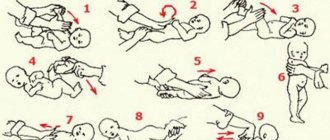- home
- >
- MAMAinfo
- >
- Why does a newborn baby sleep poorly and why is topponcino needed?
There are many reasons why a newborn baby sleeps poorly, sleeps little, or sleeps very lightly and wakes up frequently.
Unstable, interrupted sleep becomes a real torture for young parents.
This may be due to:
- - incorrect daily routine,
- - intestinal colic,
- - uncomfortable atmosphere in the room,
- - violation of usual rituals or their absence at all,
- - diaper rash on the baby’s skin, etc.
The list of reasons why a newborn baby sleeps poorly can go on for a long time.
This article will specifically focus on a little-known, but nevertheless large-scale reason for a child’s sleep disturbance associated with the need for the mother’s presence.
Many mothers face such a common problem as interrupted baby sleep. A newborn baby, after being fed or rocked in his arms, instead of the prescribed 3-4 hours, sleeps for 30-40 minutes, after which he wakes up. Such a newborn’s sleep cannot be called complete. To put a sleep-deprived baby to sleep again, you have to repeat the whole ritual again.
Intermittent sleep of a newborn child negatively affects not only the developing child’s psyche, but sometimes drives even the most patient and caring parents to exhaustion. When a newborn baby does not sleep well, it affects all family members. The process of rocking seems to be the only possible way to put a newborn to sleep. In addition to rocking in the arms, electronic swings, cribs with pendulums, pacifiers are used... In some cases, this really helps to “put the baby to sleep,” but does not establish stable sleep for him. Moreover, it becomes even more difficult to wean yourself from these bad habits...
It turns out there is a pattern
A newborn baby may wake up more often - every 15 minutes, and some individuals do not sleep on their own at all - only in their arms or on their chest.
If you track at what point this happens, you can discover a certain pattern. A newborn baby wakes up when he feels that his mother is moving away or leaving him.
In fact, it is quite natural that in the absence of the mother, the baby sleeps poorly and often wakes up - he controls whether the mother is nearby. Not consciously, of course, but at the level of a reflex.
Intuitively, mothers understand this and try to somehow adapt to this situation, prolonging the sleep of the awakening baby in various ways. For example, they put their hand on the child’s back, thereby indicating their presence, sing to him in a soothing voice, rock the cradle, and use active hissing. However, it doesn’t always work... The newborn falls asleep and wakes up.
How to prepare your child to fall asleep independently
You need to be patient and show calm. The child should feel safe. The room and crib must provide conditions for healthy sleep. It is also recommended to use rituals.
There are several tips on how to prepare your child to fall asleep on his own:
- choose a time when he is not teething, there is no colic or malaise;
- choose a daily routine in accordance with the family’s lifestyle and the needs of the baby, begin to accustom him to it in advance;
- prepare a room for a child or a separate corner;
- the crib should be comfortable: a moderately hard mattress, no pillow, beautiful bedding in soft colors;
- before going to bed, switch to quiet games for an hour, turn off the noise and TV;
- bathe in warm water, do a massage;
- come up with rituals: reading a fairy tale, a lullaby;
- put your favorite toy next to him in the crib and give him a pacifier.
It is not the child’s fault that he cannot fall asleep on his own, so you should not scold or punish him. You need to be patient and persistent, but not lead to hysteria. Crib training can take a long time, but with the right approach, your baby will soon learn to fall asleep on his own.
The situation is repeating itself
Well, if the baby wakes up and is crying, then the only way left is to take him in your arms, calm him down, wait until he falls asleep and his sleep becomes deep. Usually it is 20-30 minutes. Next comes the hardest part: transferring the sleeping baby back to his crib without him waking up.
Millions of mothers, experiencing daily suffering from the fact that their newborn child does not sleep well, ask the question: what to do in order to establish proper healthy sleep for the baby?
Why does a newborn baby sleep poorly and the situation repeats itself cyclically?
In most cases, the baby falls asleep easily and sleeps well, but is still in his arms. As soon as you put him in his crib, he wakes up.
How to teach a child to sleep in his own crib?
According to recent studies, 44% of modern parents prefer to sleep together in the same bed with their baby, and 50% take their baby into their bed during the night. Despite the fact that most families did not plan to sleep together before the baby was born.
On the one hand, co-sleeping can be very convenient indeed, especially if the baby is breastfed and the whole family manages to get enough sleep. But on the other hand, such a dream can become very unsafe if the place of sleep is organized incorrectly.
Always remember safety rules when sleeping together!
At some point in time, most parents who preferred co-sleeping begin to think about how to teach their child to sleep in his own crib? Training can be a challenging task for parents, so we have prepared some tips for you on this topic.
When is it time to move your baby to your own bed?
Parents choose to co-sleep with their children based on different principles. Some people believe that up to a certain age this is useful and correct from the point of view of establishing attachment. For others, it is convenient temporarily, for example while night breastfeeding continues . And someone is forced to sleep with the child, because the child cannot do otherwise. And for all 3 types of families, there will definitely come a time when the child himself “outgrows” co-sleeping and wants to go to his own bed (at least, he will be able to say about his desire).
But much more often, parents find co-sleeping uncomfortable before the child refuses it.
The reasons may be different:
- family relationships when one of the parents does not share (or no longer shares) the desire to sleep together,
- accumulated lack of sleep of the participants in the process (this is logical: the more people sleep together, the more restless it is for everyone, the more children tend to move actively in their sleep),
- the appearance of a younger brother or sister,
- change in parents' working hours,
- moving, as a result, changing sleeping conditions, and much more.
Even staunch supporters of co-sleeping may encounter a situation where the child has to be “removed.”
You can easily find research on both the benefits and harms of long periods of co-sleeping. And within those studies there will be all sorts of different data on what “long” means. In Russia, the topic of sleep is not a priority. And the results of foreign research are very dependent on who conducts it and where. For many cultures, long co-sleeping with parents is a tradition. For other crops, laying in a separate room at 5 weeks is the norm. And there is no universal description of how to sleep “normally” so that the child and parents are as happy as possible.
Therefore, to choose the right time, focus on the priorities of your family as a whole. If someone in the family constantly suffers from lack of sleep, this is harmful to everyone and the situation needs to be changed.
How to teach a child to sleep separately?
Naturally, children who have slept in the same bed with their mother for a long time often protest against “evacuation.” They perceive their parents' bed as their own and do not want changes. An adult lying nearby is often one of the necessary conditions for them to fall asleep and stay asleep.
If you decide to teach your baby to sleep without his parents, proceed gradually. This way, stress will be minimal for all participants in the process and transferring the baby to a new place to sleep will be easier.
1. Use an attached bassinet or crib with the side removed
Prepare an additional cradle where the baby will sleep, check it for safety . Choose the height of the mattress so that mother and baby have a single sleeping surface. Make sure that the child's sleeping place is tightly attached to the parents' bed with a special fastener and does not move away during use.
2. Separate your baby's sleeping area
After you have fed your baby, move him to his sleeping place. As soon as the baby has fallen asleep, separate his sleeping area with a bolster or edge. Such a physical boundary will let the baby know that mom sleeps separately. A boundary will also help avoid chaotic feedings and a return to co-sleeping.
3. Wear thick clothes
At night, wear tight clothing with a closed neck. This will limit the baby's access to the breast and help bring order to night feedings.
4. Respect your baby's sleep.
After your baby has fallen asleep, respect his sleep - don’t make noise, don’t turn on the lights, don’t use mobile devices near him. Remember that sleeping conditions make for better quality sleep.
5. Keep interaction to a minimum at night.
At night, try to interact with your child as little as possible. Don't talk, don't turn on the light. Show with all your appearance that it is night and you need to sleep.
6. Feed as soon as the baby wakes up. If you are not going to feed, help you fall asleep differently!
If your baby wakes up to feed, feed immediately after waking up. If it’s not time to feed yet, try to calm him down in another way - shush him, pet the baby, put your hand on his tummy. We wrote in detail about all the ways to calm a baby in the article Calm a child not only with food
VIDEO LESSON
How to teach yourself to fall asleep on your own?
More details
Baby sleeps alone
Once the baby has realized that he sleeps in his place, access to mom and mom's breast is limited and he has a separate area for sleeping. You can move the crib further from the parent's and restore the side.
There are several important rules:
- Develop and maintain a good attitude towards the crib
Most often, mom uses the crib as a playpen when she needs to do household chores or take a quick shower. The child begins to be afraid of the place where his mother puts him to sleep, because for him the crib is the same as his mother leaving.
To ensure that your child is not afraid of the crib and does not express resistance when his mother tries to put him there to sleep, try to maintain a good attitude towards your crib:
- never use the crib as a playpen
- Avoid situations where the baby cries alone
- Make your baby's sleeping area as boring as possible
Try to create the association “sleep in bed, play outside”; make the place for your baby to sleep as boring as possible:
- do not place your baby there to play
- avoid storing toys, do not use a mobile phone - it is unsafe and distracts the baby from sleep
- place the baby’s sleeping place in the part of the room farthest from the window
- remove from the baby’s field of vision everything that can frighten and distract from sleep - toys, pictures, electrical appliances, cover up indicator lights
- Teach you to fall asleep and wake up in your crib for your morning nap
All experiments with sleep are always easier in the morning. A baby who has rested after a long period of sleep at night, and is not yet overtired, accepts innovations more easily. Try placing a sleepy but awake baby in his crib for his first nap/morning nap. Sit next to him and help him fall asleep. If the experiment fails, put the sleeping baby in bed and teach him to wake up in the crib first.
- Sleeping at night separately from parents
Has the baby realized that the crib is a friendly place where you can fall asleep, sleep and wake up? Then you can try switching to a separate night's sleep. Just don’t leave your baby alone, be there, help him calm down and fall asleep.
How to teach babies over 1.5 years old to sleep separately?
As they grow older and develop their imagination, fear of imaginary night monsters, or an aggravated fear of separation from their mother may be added to the reluctance to change.
- If your baby can already speak, discuss any changes with him in advance. Ask him what worries him about moving into his own crib, and what needs to be done to make him like it there.
- sleep toys with you to bedtime This way the baby will feel less lonely and more protected at night.
- To prevent fear of separation during the day, play more often with your child in the bedroom so that he has an association that the place where the baby sleeps is not only a place where there is a little “separation” from his mother, but part of his own cozy world.
- Give your child more time in the evening, lengthen evening rituals . Getting ready for bed at this time can take up to 1 hour.
- And most importantly, be consistent. The less you confuse your baby by deviating from the agreed rules, the easier and faster his adaptation to the new order will be.
All of the above does not mean that you need to “separate” your baby right now, because sleeping separately is “normal.” Deciding when to do this is a family decision.
Considering that you will explain everything to your child in advance in a calm, friendly atmosphere, everything will go easier and faster than you expect. You will not put your baby in a scary dark corner, but in a cozy crib, where he likes everything, where a “friend” is waiting for him - a toy that you chose together, where you can light a little magic night light that will scare away all fears and anxieties.
SleepingIn Your Crib SharedSleepingBreastfeedingSleep Conditions
Self-Falling Sleep Toy
A sense of security is the key to stable sleep
The thing is that in the first months after the birth of a baby, there is a very strong invisible connection between the mother and the newborn child. This is due to the fact that the life of a newborn is almost 100% dependent on the mother, because she is, first and foremost, a source of nutrition! Food! Nature has built into its creations a very strong instinct of self-preservation. Otherwise, life on Earth would have ended long ago. That is why, when a newborn baby is sleeping and his mother leaves him somewhere, he feels that he is losing his usual vital safety landmarks - the smell of his mother, breast milk and the feeling of warmth. It's not safe for him! The baby's brain gives a wake-up signal, and the newborn baby begins to call for his mother.
Still have doubts?
So, children usually fall asleep quickly and sleep peacefully if their mother is close - after all, this is natural. But what are we doing? We insist that the baby sleep in his own crib. As a result, he cries and sleeps poorly, which means a sleepless night for you too. That's why many people give in and put their children to sleep next to them.
Many of our grandparents generally slept as a family on one large bed. However, instead of doing the same, we are looking for more and more arguments against children continuing to sleep next to their parents.
Trust what your heart tells you. And listen to your child's wants and needs.
Found a violation? Report content
Pros of co-sleeping
There are, of course, more advantages to sleeping together between an infant and parents than the disadvantages:
- It is easier for a mother to breastfeed her baby, since she does not have to get out of bed several times a night. Almost all babies ask for the breast at least two or three times during the night. But here too, mom needs to be very careful. You should not sleep while feeding, so as not to inadvertently crush the baby. If the mother is very tired and does not get enough sleep, then even at night the baby should be fed in a sitting position. Or you can ask your husband to look after the sleeping mother and baby while the baby nurses.
- The mother constantly hears the breathing of her baby, even in her sleep, which means she will be able to respond in time to any concern of the child.
- The mother sleeping next to her will cover the baby if it is cold or, on the contrary, will reveal it if he is hot.
- The mother who is nearby will not allow the child to bury his face in the pillow.
- The child always feels the mother's condition. If mom doesn’t have to constantly twitch and run to the crib at night, her sleep will be more restful. This means that the baby will sleep sounder and longer. Then both the child and the mother will get enough sleep. And a well-slept and rested mother will have more strength to work with her child during the daytime.










